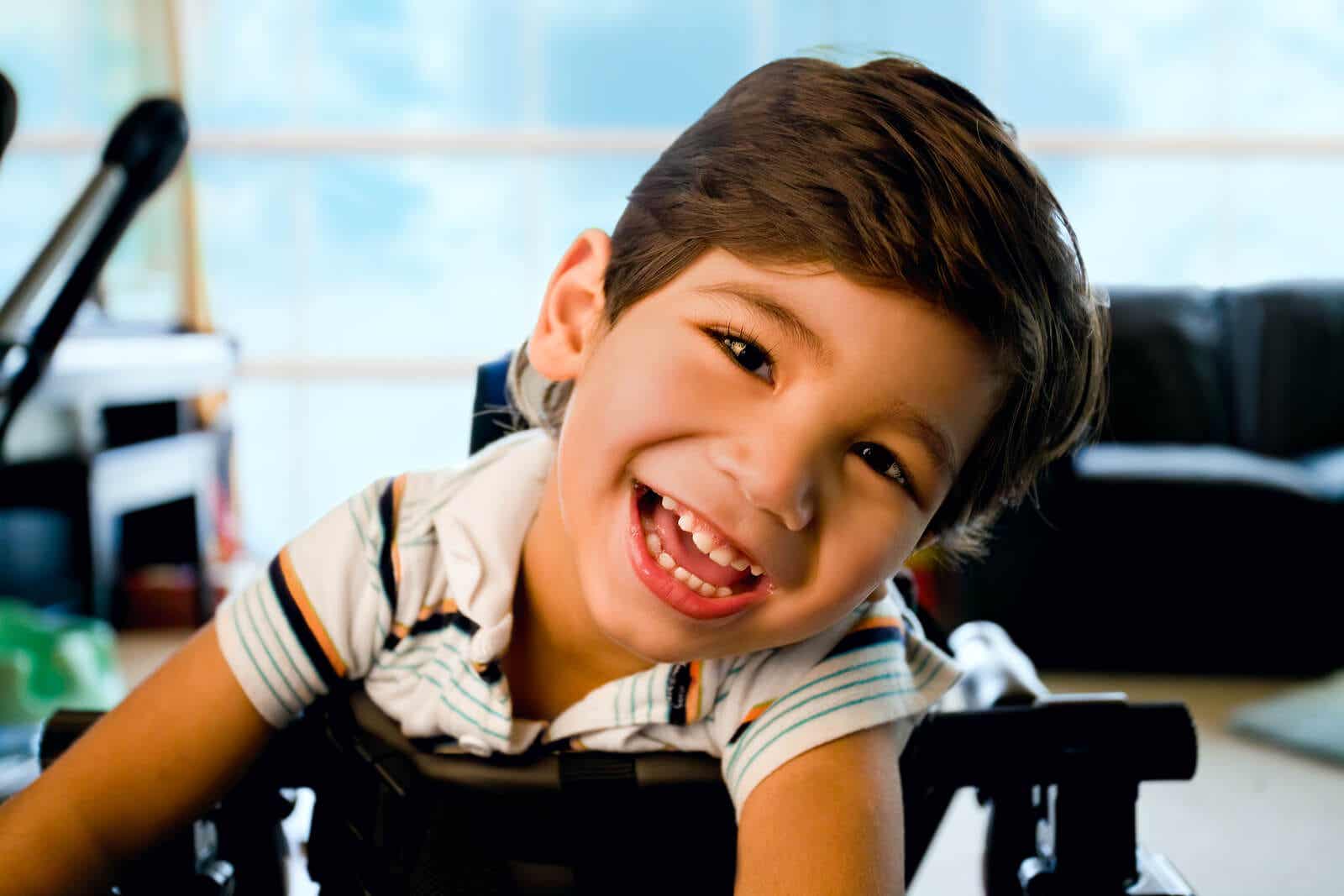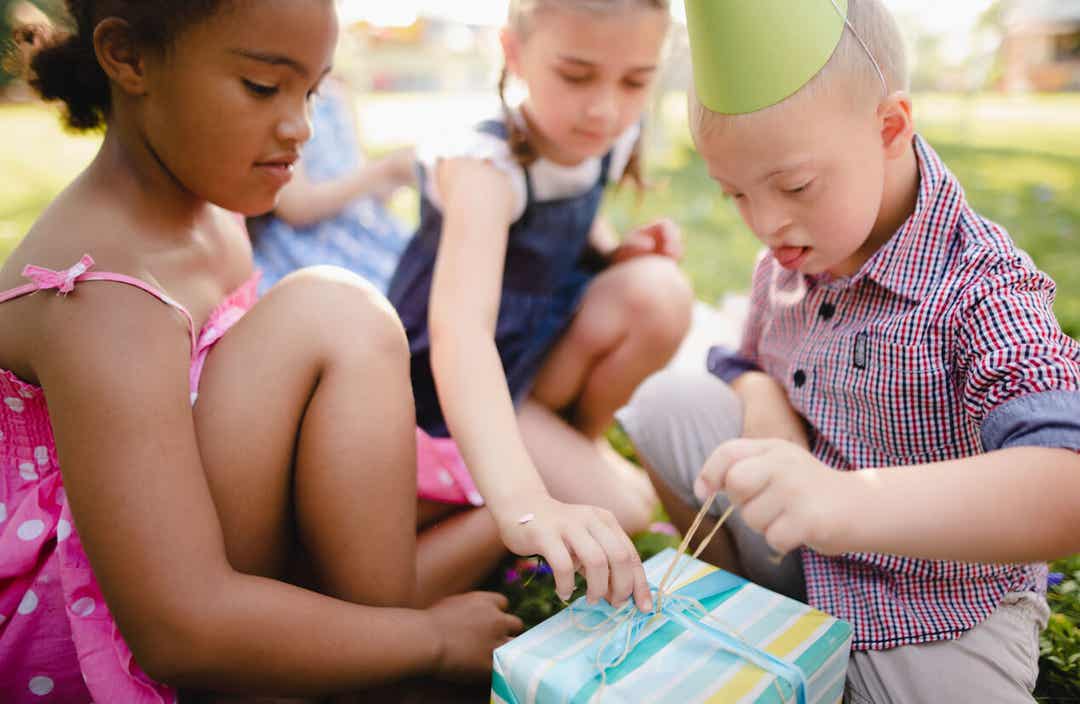How to Talk to Children About Disabilities


Written and verified by the child educator Pedro González Núñez
Preventing a child from talking about subjects we considered “taboo” was a common trend in early childhood education until not too many years ago. For example, in the past, people would wait to talk to children about disabilities until they were closer to adolescence. Hiding more “dramatic” issues was something we considered as a way to protect infants.
Be that as it may, it’s actually better to discuss this issue with children when they’re young. That’s because, as we know, little ones aren’t exactly subtle or discreet. If they’re two or three years old, they probably won’t notice a disability that’s not very visible. However, from the age of four onward, following their curiosity and innocence, they’ll ask straightforward questions without even thinking that they may be offensive or hurtful.
That’s why it’s important to talk to them about these issues so that they don’t see them as taboo. And not only that, but also so that they understand disabilities and don’t judge them. A person with a disability is no better or worse than anyone else, and it’s important that society internalizes their normalization from early childhood.
Strategies for talking to your children about disabilities

To avoid getting into high-risk situations, it’s advisable to consider strategies for talking to children about disabilities. Having said that, we’re going to discuss some strategies that we think you should keep in mind and apply with your little ones. Take note.
Choose the right moment
Choosing the right moment is a key point. Therefore, if your child comes across someone with a disability, it could be a good opportunity to talk about the subject. Take advantage of the opportunity to explain the possible reasons for the differences. And, above all else, make them understand that they must adopt an attitude of inclusion and acceptance towards these people, who they shouldn’t judge because of their disabilities.
Talk to your children about disabilities: answer questions directly
When adults beat around the bush to explain a topic to children, it’s normal for them to be suspicious and think that we’re talking about something negative. That’s why you should be direct and explain the subject as it is. Avoid too many shortcuts and don’t beat around the bush. The simplest answer is usually the most appropriate.
Be careful with your words when talking to your children about disabilities
Choose the words you use carefully. These people have a disability, they’re not “retarded”, “handicapped” or “abnormal”. These are all terms that, with the passing of time, are considered to be very pejorative. Nor should we differentiate between people with disabilities and “normal” people, since disabilities are actually very common. Therefore, there’s no reason to consider people with disabilities as “not normal”.
Emphasize equality
As we say, a child with a psychological or physical disability is still a child. They may be taller, shorter, blond or brown-haired, thinner or less thin, and so on. That’s why it’s important to emphasize that there’s no reason that these differences should separate us, since each person is unique and valuable, with their own particularities and personality.
Talk to children about disabilities: normalize the environment
There are children who become nervous in the presence of people with disabilities. That’s why we need to normalize the subject, as this attitude is the result of fear out of pure ignorance. Therefore, we need to teach our little ones that there’s nothing wrong with being different physically or mentally. And, at the same time, it’s not contagious or anything like that.
Teach respect when talking to your child about disability

The sooner that children learn to respect everything around them, the sooner they’ll understand that it’s not good to laugh at people with disabilities.
It’s important to explain in terms that your children understand that insulting or laughing at people with disabilities can be painful and humiliating. In reality, these individuals aren’t inferior or superior, they’re our equals. It’s as simple as that.
Discover more: 4 Children’s Stories that Teach Tolerance
Seize the moment if the situation allows it
If you don’t know how to talk to your children about disabilities, it may not be a good idea to force the issue. On the contrary, it might be a good idea to take advantage of the occasions that arise, as we’ve mentioned. For example, when you see a person who has a disability when the child asks questions and is curious.
In short, always keep these ideas in mind to talk to your children about disability in a sensible, natural, and efficient way. This way, you’ll see how your children will begin to respect these people in a simple way, without seeing disabilities as a problem or something to be feared.
Preventing a child from talking about subjects we considered “taboo” was a common trend in early childhood education until not too many years ago. For example, in the past, people would wait to talk to children about disabilities until they were closer to adolescence. Hiding more “dramatic” issues was something we considered as a way to protect infants.
Be that as it may, it’s actually better to discuss this issue with children when they’re young. That’s because, as we know, little ones aren’t exactly subtle or discreet. If they’re two or three years old, they probably won’t notice a disability that’s not very visible. However, from the age of four onward, following their curiosity and innocence, they’ll ask straightforward questions without even thinking that they may be offensive or hurtful.
That’s why it’s important to talk to them about these issues so that they don’t see them as taboo. And not only that, but also so that they understand disabilities and don’t judge them. A person with a disability is no better or worse than anyone else, and it’s important that society internalizes their normalization from early childhood.
Strategies for talking to your children about disabilities

To avoid getting into high-risk situations, it’s advisable to consider strategies for talking to children about disabilities. Having said that, we’re going to discuss some strategies that we think you should keep in mind and apply with your little ones. Take note.
Choose the right moment
Choosing the right moment is a key point. Therefore, if your child comes across someone with a disability, it could be a good opportunity to talk about the subject. Take advantage of the opportunity to explain the possible reasons for the differences. And, above all else, make them understand that they must adopt an attitude of inclusion and acceptance towards these people, who they shouldn’t judge because of their disabilities.
Talk to your children about disabilities: answer questions directly
When adults beat around the bush to explain a topic to children, it’s normal for them to be suspicious and think that we’re talking about something negative. That’s why you should be direct and explain the subject as it is. Avoid too many shortcuts and don’t beat around the bush. The simplest answer is usually the most appropriate.
Be careful with your words when talking to your children about disabilities
Choose the words you use carefully. These people have a disability, they’re not “retarded”, “handicapped” or “abnormal”. These are all terms that, with the passing of time, are considered to be very pejorative. Nor should we differentiate between people with disabilities and “normal” people, since disabilities are actually very common. Therefore, there’s no reason to consider people with disabilities as “not normal”.
Emphasize equality
As we say, a child with a psychological or physical disability is still a child. They may be taller, shorter, blond or brown-haired, thinner or less thin, and so on. That’s why it’s important to emphasize that there’s no reason that these differences should separate us, since each person is unique and valuable, with their own particularities and personality.
Talk to children about disabilities: normalize the environment
There are children who become nervous in the presence of people with disabilities. That’s why we need to normalize the subject, as this attitude is the result of fear out of pure ignorance. Therefore, we need to teach our little ones that there’s nothing wrong with being different physically or mentally. And, at the same time, it’s not contagious or anything like that.
Teach respect when talking to your child about disability

The sooner that children learn to respect everything around them, the sooner they’ll understand that it’s not good to laugh at people with disabilities.
It’s important to explain in terms that your children understand that insulting or laughing at people with disabilities can be painful and humiliating. In reality, these individuals aren’t inferior or superior, they’re our equals. It’s as simple as that.
Discover more: 4 Children’s Stories that Teach Tolerance
Seize the moment if the situation allows it
If you don’t know how to talk to your children about disabilities, it may not be a good idea to force the issue. On the contrary, it might be a good idea to take advantage of the occasions that arise, as we’ve mentioned. For example, when you see a person who has a disability when the child asks questions and is curious.
In short, always keep these ideas in mind to talk to your children about disability in a sensible, natural, and efficient way. This way, you’ll see how your children will begin to respect these people in a simple way, without seeing disabilities as a problem or something to be feared.
All cited sources were thoroughly reviewed by our team to ensure their quality, reliability, currency, and validity. The bibliography of this article was considered reliable and of academic or scientific accuracy.
- Faber, A., Mazlish, E., (2005). Cómo hablar para que los niños escuchen. Y cómo escuchar para que los niños hablen. Editorial Non Basic Stock Line.
This text is provided for informational purposes only and does not replace consultation with a professional. If in doubt, consult your specialist.








